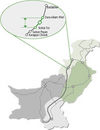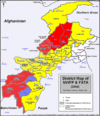With peace agreements signed between the Taliban in Swat, Bajaur, and Mohmand, and talks under way in South Waziristan, the Pakistani government is pushing forward with negotiations in northwestern Pakistan. The government is in talks with the Taliban in the settled district of Kohat in the Northwest Frontier Province, where heavy fighting has taken place this year.
Word of the negotiations was leaked by unnamed sources to The News on May 28. “The government wanted to keep the media away from details of the peace deal and also it did not want peace accord to be made public,” sources told The News. But the Taliban went on record to confirm the negotiations.
The Taliban have called a cease-fire after approving of the talks, Dawn reported. “Now we are completely satisfied and trust the man provided by the government as a guarantor, and announce immediate cease fire,” said Muhammad, a spokesman for Tariq, the Taliban commander in Darra Adam Khel. “Formal talks for finalizing modalities of the peace deal would commence from Thursday.”
The exact terms of any peace deal are not known, but according to information provided to The News, the peace agreement would mirror the other agreements signed in the tribal areas and the Northwest Frontier Province. The known details of the proposed Kohat Accord are:
• The Pakistani Army would withdraw from Darra Adam Khel, leaving only the local paramilitary forces to secure the region.
• The government would compensate those impacted by fighting in the region.
• The government would release captured Taliban fighters.
• The Taliban would recognize the government’s writ.
• The Taliban would “renounce militancy and remain peaceful.”
• The Taliban would not carry weapons in public.
• The Taliban would halt attacks on government installations.
• The Taliban would halt attacks on the Indus Highway and protect the Kohat Tunnel.
|
Red agencies/ districts controlled by the Taliban; purple is de facto control; yellow is under threat. |
Recent fighting in Kohat
The Taliban and the Pakistani military have fought pitched battles in the city of Darra Adam Khel and at the Kohat tunnel since January.
The Taliban hijacked a military convoy in Darra Adam Khel and seized weapons destined for the military operation in South Waziristan in late January. Clashes ensued as the Pakistani military moved forces into the region to battle the Taliban, but the military backed down and quickly formed a “peace jirga” to negotiate with the Taliban.
The Taliban responded by taking control of the strategic Kohat Tunnel, a vital link on the Indus Highway that connects Peshawar to the southern tribal agencies and settled districts. The Taliban kidnapped more than 50 paramilitary troops from the Frontier Corps during the fighting at the Kohat Tunnel. Several soldiers and paramilitaries were beheaded and mutilated. The government retook the Kohat Tunnel after days of fierce fighting, but not before the Taliban damaged the tunnel during an attempt to destroy it.
On March 2, the Taliban conducted a suicide bombing on a tribal jirga being held in the town of Zargoan in Kohat. More than 40 Pakistanis were killed and 40 wounded when a suicide bomber detonated his vest in the middle of the crowd as they exited the meeting.
The tribal jirga, or meeting, was attended by over 1,500 members of five local tribes. The meeting “was convened to [analyze] the security situation in troubled Darra Adam Khel and suggest ways and means to flush out militants” from Kohat, the Associated Press of Pakistan, the government’s news organization, reported. “Most of the victims were local tribesmen and tribal elders,” APP reported. At least one tribal leader and the father of a Pakistani senator were killed.
On May 1, the Pakistani military pulled out from Darra Adam Khel. The Taliban immediately re-emerged and began levying taxes on vehicles traveling on the Indus Highway. The Pakistani Army, backed by tanks, rolled back into Darra Adam Khel on May 11, and fighting ensued. The fighting shut down the Indus Highway.
For more information on the terms of the peace agreements in Swat, Bajaur, and Mohmand, and the proposed terms for the agreement in South Waziristan, see:
Pakistani government inks peace deal with Swat Taliban
Pakistan is negotiating a new peace agreement with Baitullah Mehsud (South Waziristan)
Pakistan releases Taliban leader, signs peace deal with outlawed Taliban group (Bajaur, Malakand Division)
Pakistan strikes deal with the Taliban in Mohmand
See The Fall of Northwestern Pakistan: An Online History for more information on the rise of al Qaeda and the Taliban in Pakistan and the peace agreements signed between the government and the Taliban.










8 Comments
I’m wondering if all these peace agreements won’t eentually leave the Taliban with their own country? Could the Pakistani government be allowing that development with the intention of turning the US military loose in the territories?
walstuz,
Plenty of people said the same exact thing in September 2006 and after subsequent negotiations in Bajaur, Mohmand, Swat in 2007. It never came to pass.
Walstuz: the Pathans think long term…nobody will ever take control of their territory (FATA). AQ and Taliban are throwing big bucks at the tribal maliks these days (ISI too), and local religious leaders, but they are already wearing out their welcome. This is the land of zar, zan, zamin…i.e. money and land are king and whoever is the highest bidder for the services of the local maliks, wins. Old Pakhtun proverb:
Khalik-i-Khuda
Malk-Sirkar
Hakm-i-Sahiban alishan
Translation (I think):
Mankind to God
Land to the Government
Power to the ominipotent Sahibs
When the $$ runs out, so will the bad guys. Whoever controls the local maliks (Sahibs), wins – at least that’s how it’s been for the past 1,000 years or so. I’ll take the Pathans over the Arabs any day in a straight up fight – no contest. They dislike the Saudis, in particular, who as we all know, are the weakest of the Arabs.
Six months ago, I witnessed myself a local guy take on a younger Saudi dude just outside the gates of the Serena Hotel in Islamabad; it was straight up – and the Saudi guy, who was much bigger, got a pretty good licking before it was over.
Stay tuned as this is going to be very interesting over the next six months.
Re: turning loose the U.S. military loose in the FATA – not a good idea. Precision strikes are effective against the HVTs, but the tipping point will be when the indigenous Pakhtuns turn on the Arab invaders/Afghan Taliban elements – and they will. Exactly how this is done is way above my pay grade… but I think it involves a carefully planned grass roots program of some kind probably involving the long heads…with one big difference: Maliks don’t respond to negative reinforcement, you reward and pay them for GOOD behavior/protection – and for god sakes, don’t ever reduce their monthly stipend!
And Bill: GREAT site – what a relief to find some balanced reporting. Some of the best reporting I have seen from public sources. Keep up the faith and the great work…you’re making a difference. I sense you’re a bit anxious….no worries, Bill, you won’t read this in the mainstream news, but in the end, the Mighty Pathans will be with us.
No more posts for awhile – off to kick some more dust.
The Taliban is like Muqtada Al Sadr: When they want to talk, it’s time to press on.
The Thunder Run has linked to this post in the blog post From the Front: 05/30/2008 News and Personal dispatches from the front lines.
Bill, you have a link up under “Today In…Pakistan” that mentions briefly a number of mortars fired from Afghanistan INTO Pakistan’s South Wazristan. Do we know…were those NATO mortars? And if not, who is doing that?
Great stuff here as always Bill.